| |
| |
| |
| Presented By OurCrowd |
| |
| Axios World |
| By Dave Lawler ·Aug 09, 2021 |
| Welcome back to Axios World. - I'm feeling recharged after a week off and glad to be back with you. Let's start tonight in Australia.
- Tonight's edition is 1,556 words (6 minutes). Subscribe here and tell a friend.
|
| |
| |
| 1 big thing: Cabin fever in "Fortress Australia" |
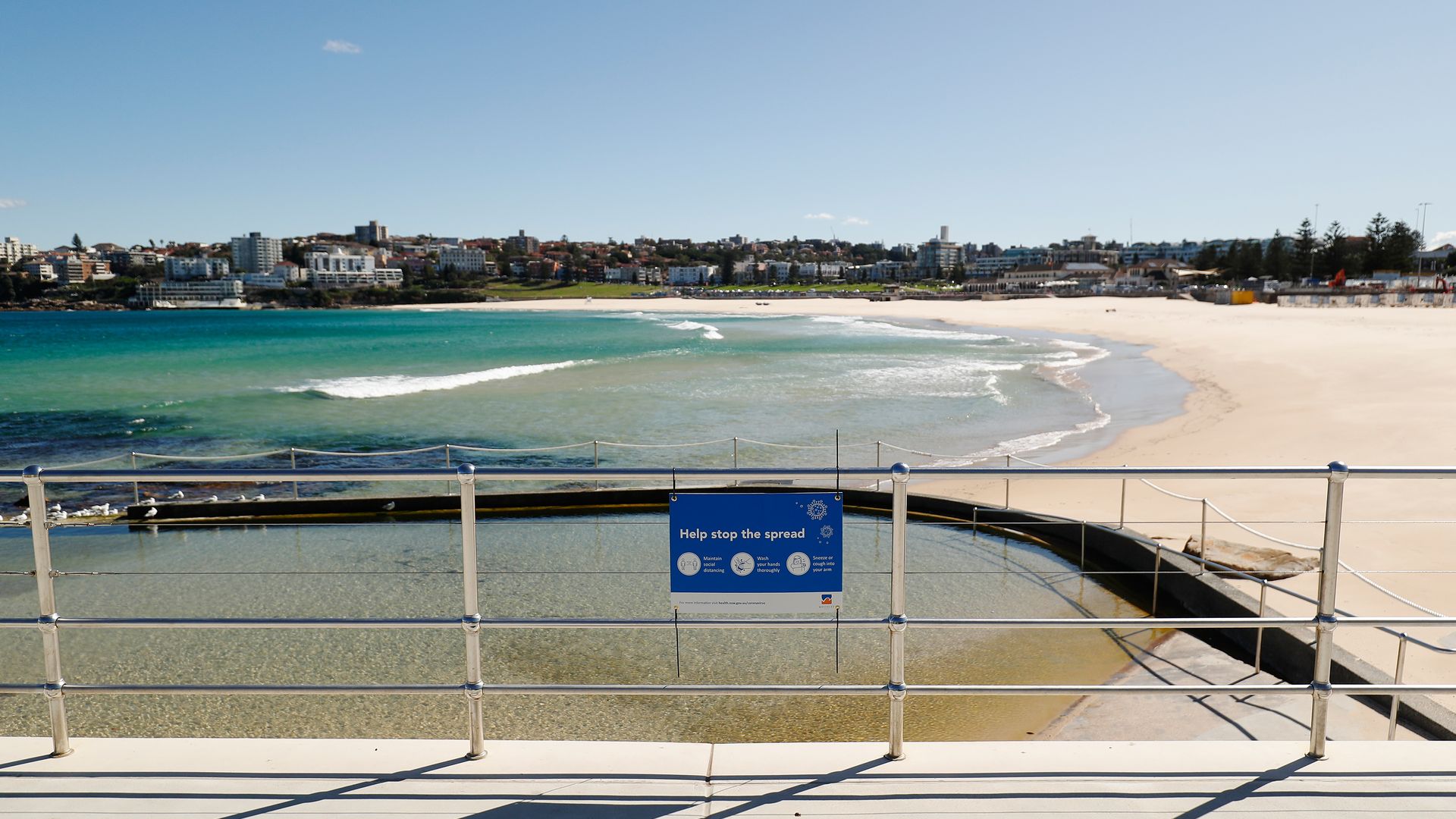 |
|
| An empty stretch of Bondi Beach in Sydney. Photo: Brendon Thorne/Bloomberg via Getty Images |
| |
| With the possible exception of North Korea, no country has gone to greater extremes to cut itself off from the world during the pandemic than Australia. Why it matters: Australia's approach of shutting down at the first hint of an outbreak and keeping the borders hermetically sealed — including to its own citizens — have proved both effective and popular, until now. With vaccinations lagging, some Australians are wondering how long they can go on like this. Driving the news: Most citizens are banned from leaving the country except in exceptional circumstances, and as of Wednesday, that will include even expatriates attempting to return home from Australia. - There's also a backlog of 35,000 Australians hoping to return to the country — which requires two weeks in a quarantine hotel — because only around 3,000 people are allowed to enter each week, per the Sydney Morning Herald.
- Australia went so far as to bar its citizens in India from returning in the spring, stranding them in the midst of a brutal COVID-19 wave and threatening to fine or jail anyone who defied the ban.
- The "Fortress Australia" approach has left families divided, but it also won the approval of most Australians.
As the pandemic raged elsewhere, Australia capitalized on its geography to keep all but a few cases out and employed swift lockdowns whenever they were detected. - The "new normal" arrived early. Pubs and stadiums filled, with case counts near zero.
- Several European countries have endured higher single-day death tolls than the 940 Australia has recorded over the entirety of the pandemic.
- Prime Minister Scott Morrison's approval rating doubled from 33% to 67% in the early months of the pandemic, per Morning Consult's tracker, but recently slid under 50%.
Vaccines have been his undoing. - 36% of Australians have had a single dose and 18% are fully vaccinated, putting Australia 35th of 38 in the OECD club of rich countries, per The Guardian.
- Morrison's government intended to use a mix of Pfizer and AstraZeneca, but didn't secure enough of the former and suspended the latter for under-60s due to blood clot concerns, before resuming its use.
- The government has been scrambling to catch up. Morrison announced today that Moderna had been approved and doses would arrive in late September.
Meanwhile, Australia's two largest cities are under strict lockdowns as the Delta variant spreads. - There have been large protests against restrictions in greater Sydney, where residents can only leave home for a handful of reasons, like exercise or medical care.
- The hair-trigger lockdowns have meant that a coastal region and rural town, both yet to record a COVID-19 case, locked down today because they'd been visited by an infected person.
- "I know they're sick of it. I know they're angry, and I know they want it to stop and for life to get back to where they knew it," Morrison told reporters today of the local and regional lockdowns. "But there can be no shortcuts."
What's next: Morrison has said that the reopening can begin and travel bans can be eased once vaccination rates among the eligible population hit 70% and 80%, respectively. - The government is aiming to offer a first dose to any adult who wants one by the end of this year.
The bottom line: Australians were shielded as cases spread widely in other large, rich countries. But as vaccines began to proliferate, Australia was left watching from afar. |
    |
| |
| |
| 2. Afghanistan: City after city falls to Taliban |
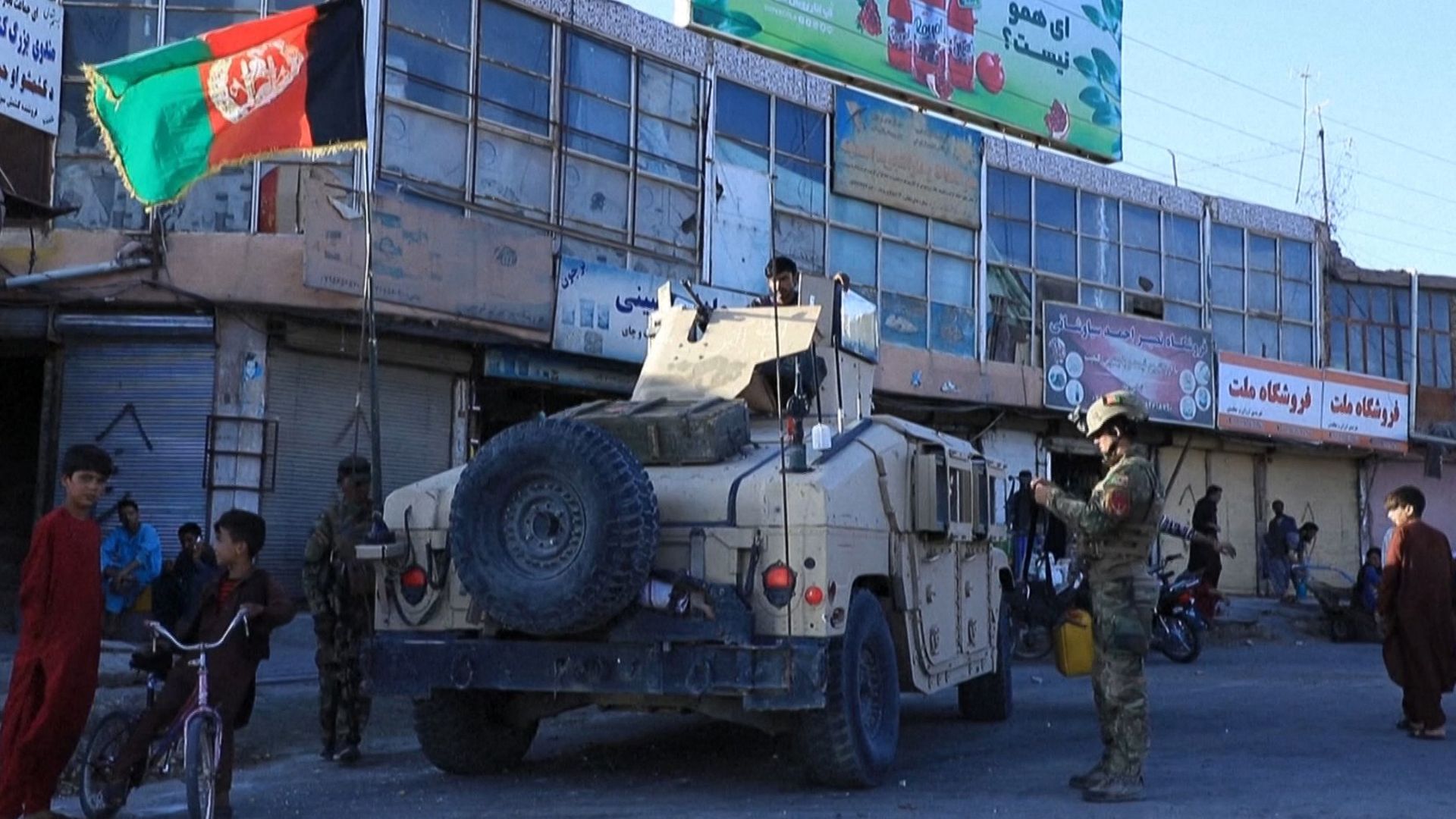 |
|
| Afghan special forces patrol Herat. Photo: Aref Karimi/AFPTV/AFP via Getty |
| |
| Six Afghan provincial capitals have fallen to the Taliban since Friday, Reuters reports, with the militants taking the town of Aybak today and targeting northern Afghanistan's largest city, Mazar-i-Sharif. Why it matters: The string of swift Taliban successes in the final weeks of the U.S. withdrawal has dented hopes that the Afghan military and allied militias will be able to fend off the insurgency. - 229 Afghan districts are now under Taliban control, 66 are controlled by the government, and 112 are contested, per the Long War Journal. Most of the initial gains were in the countryside, but the Taliban is now targeting major cities.
- Flashback: As of June 16, the Taliban and government controlled a roughly equal number of districts (104 and 94, respectively) with 201 contested.
- The Taliban is also targeting senior officials for assassination. Dawa Khan Menapal, who ran the government's media department, was killed on Friday, shortly after a failed assassination attempt on Afghanistan's defense minister.
What they're saying: U.K. Defense Secretary Ben Wallace was the latest to question the decision of U.S. and NATO forces to rapidly withdraw before the 20th anniversary of the Sept. 11 attacks. - He told the Daily Mail that the U.K. had sought an agreement for some NATO troops to remain but "without the United States as the framework nation it had been, these options were closed off."
- A Pentagon spokesperson said today that "these are their provincial capitals" and it's up to the Afghan government to defend them.
What to watch: Afghan officials are seeking continued U.S. air support after the withdrawal, but the Pentagon hasn't said whether and how it would conduct such operations. |
    |
| |
| |
| 3. New sanctions in Belarus a year after uprising |
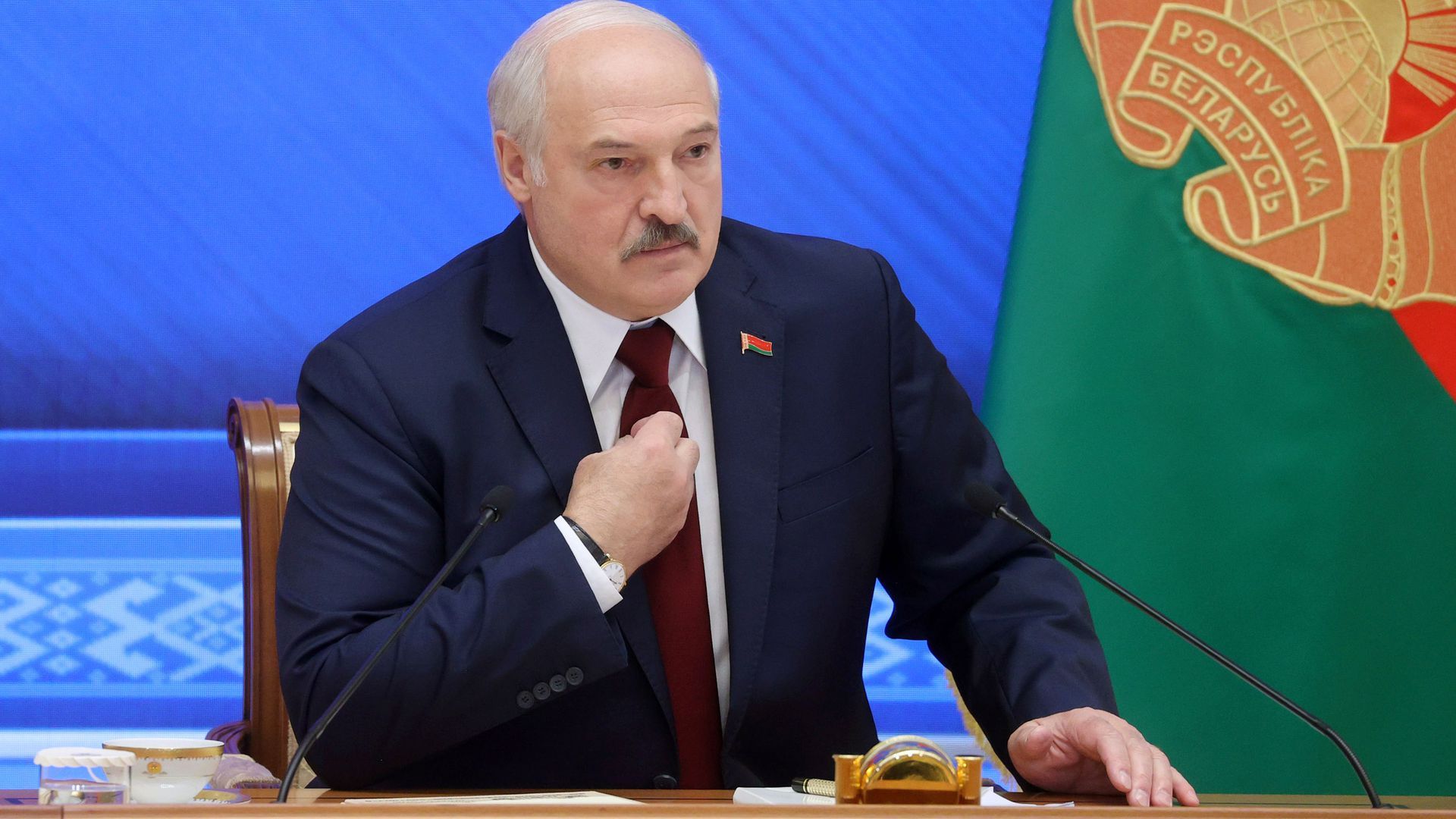 |
|
| Belarusian President Aleksandr Lukashenko speaking in Minsk on Aug. 9. Photo: Nikolai Petrov\TASS via Getty Images |
| |
| The U.S., U.K. and Canada imposed an array of new sanctions against Belarus on Monday, the first anniversary of a fraudulent election that triggered a national protest movement against President Aleksandr Lukashenko, Axios' Jacob Knutson writes. Why it matters: Previous Western sanctions have so far done little to influence Lukashenko's behavior as he clings to power — with the support of Russian President Vladimir Putin — by jailing his political opponents, arresting journalists and publicly attacking those who criticize his regime. - The new sanctions target the country's potash, oil and tobacco exports, its defense, transportation and construction sectors, and several prominent business leaders.
- Opposition leader Sviatlana Tsikhanouskaya pressed Secretary of State Tony Blinken and other top officials to impose new sanctions in a recent visit to D.C., she told Axios.
What he's saying: "You are America's lapdogs," a furious Lukashenko responded on Monday when asked about the U.K.'s sanctions, telling London they can "choke on them." - Lukashenko also claimed sprinter Krystsina Tsimanouskaya, who defected at the Olympics, had been "manipulated" by foreign forces and he denied a role in the death of an exiled activist last week in Kyiv.
- Headlines like those will continue to highlight Lukashenko's status as an international pariah, but have seemed to do little to weaken his grip on power.
|
    |
| |
| |
| A message from OurCrowd |
| OurCrowd helps you add top startups to your portfolio |
| |
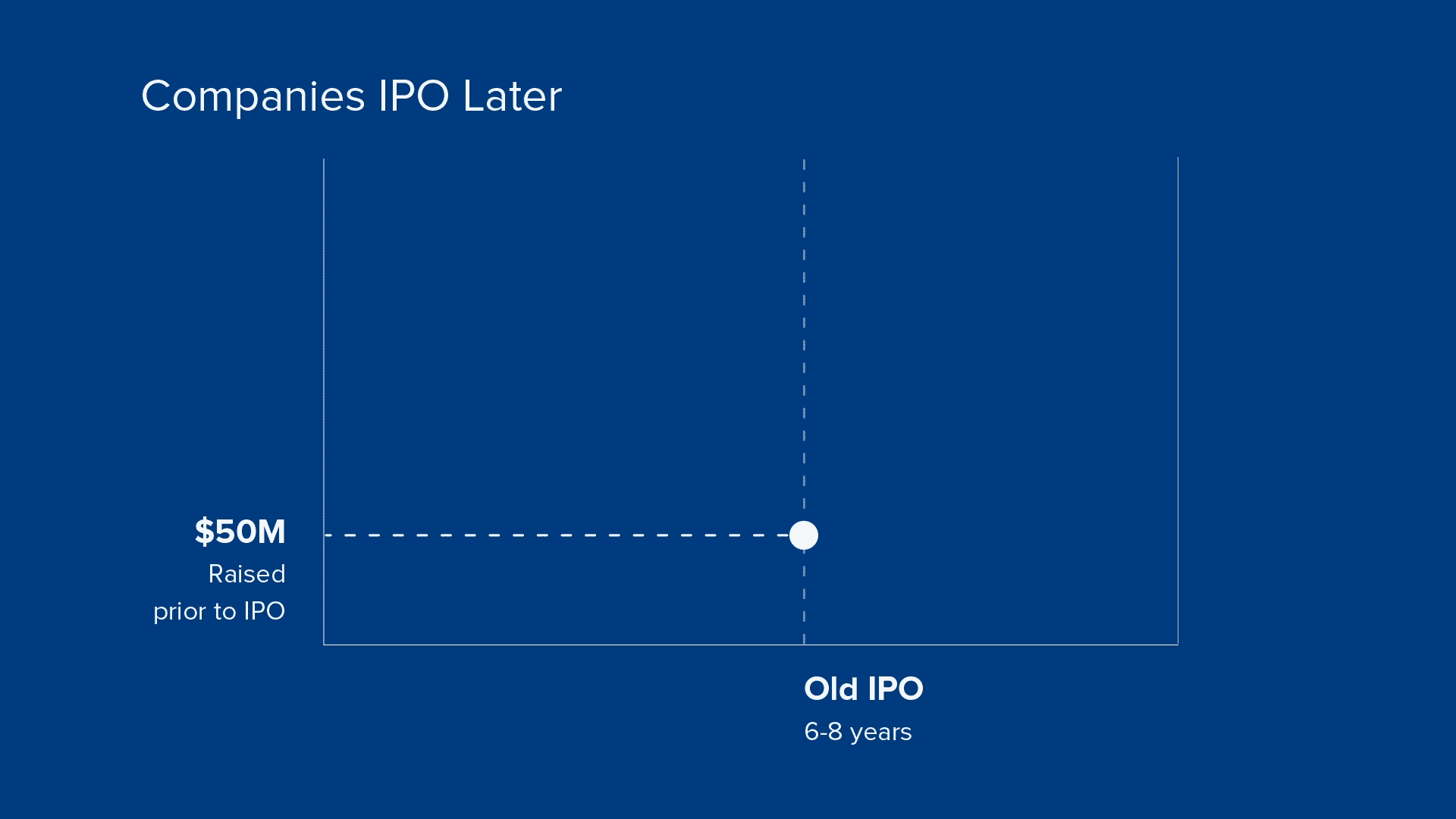 |
| |
| Problem: Startups are staying private longer, keeping investment growth behind closed doors. Solution: OurCrowd is changing that. They have 73K members and have invested $1B+ in companies like Lemonade and Beyond Meat — pre-IPO. Get in early on tomorrow's big deal - with OurCrowd. |
| |
| |
| Bonus: Where in the World |
 |
|
| Screengrab via Apple Maps |
| |
| This is a slightly obscure one, but I hope you'll bear with me. What are the red and purple pins indicating, and what do those locations have in common? Scroll to bottom for answer. |
    |
| |
| |
| 4. Intimidation in Zambia ahead of election |
 |
|
| Election posters in the marketplace. Photo: Marco Longari/AFP via Getty |
| |
| In Zambia's capital, Lusaka, signs of support for the ruling party are on full display ahead of Thursday's election, but opposition supporters are keeping their sentiments to themselves to avoid violence and intimidation, AFP reports. The big picture: The economy has shrunk, food prices have spiked, and President Edgar Lungu's approval rating has fallen from 60% to 46% over the past four years, per Afrobarometer. But Lungu will not be contesting the election on a level playing field. - Lungu's government has largely prevented opposition candidate Hakainde Hichilema's party from campaigning, arrested some of his supporters and squeezed independent media outlets.
- The ruling Patriotic Front has overseen a decade of democratic backsliding in the southern African country, the Economist reports.
- Per Afrobarometer, satisfaction with democracy has steadily fallen from 68% in 2013 to 37% now.
What to watch: Assuming Lungu does remain in power, his victory won't be greeted with much enthusiasm. Just 22% of Zambians think the country is headed in the right direction. |
    |
| |
| |
| 5. Global news roundup |
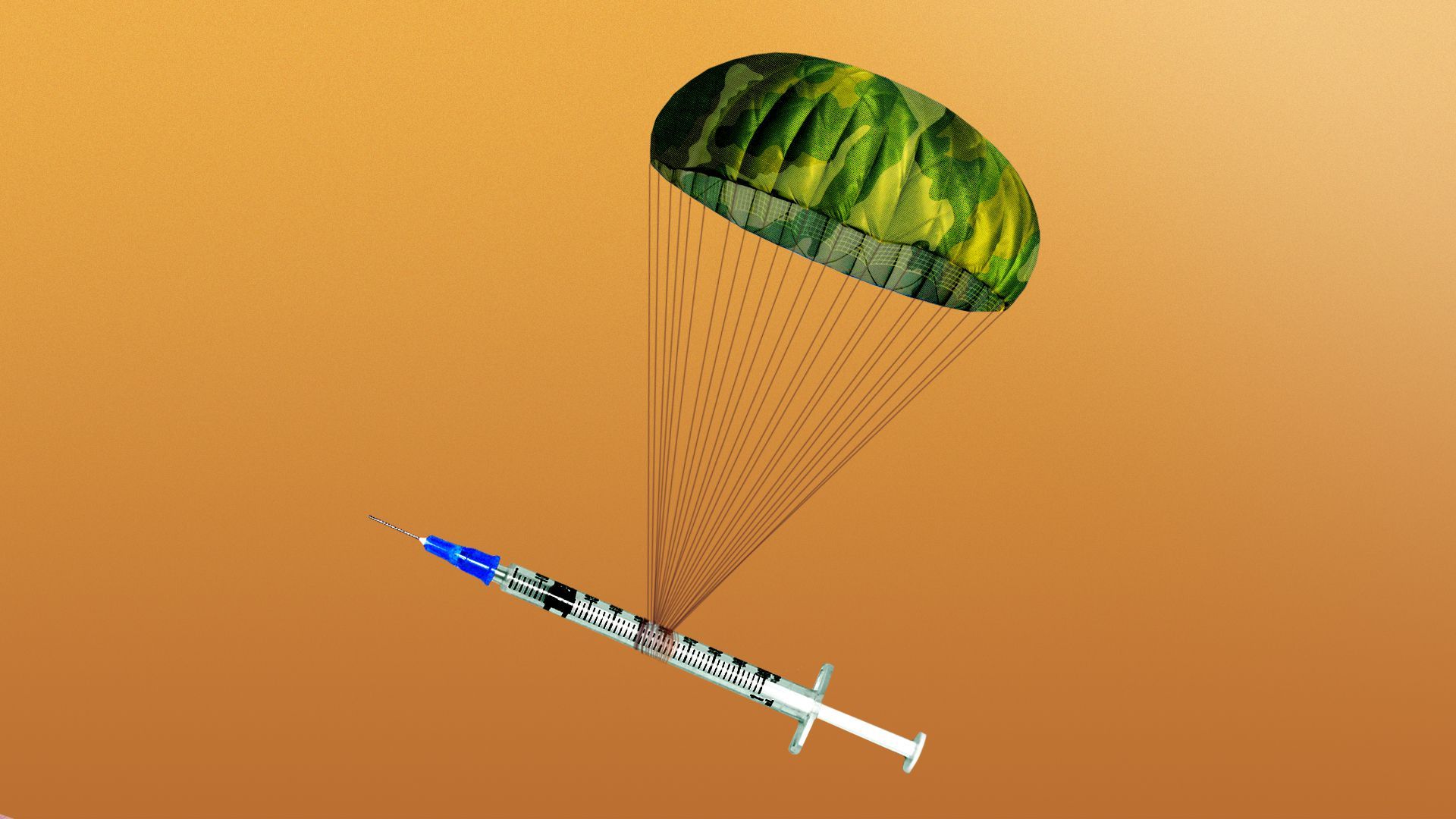 |
|
| Illustration: Annelise Capossela/Axios |
| |
| 1. The Pentagon will require members of the military to get the COVID-19 vaccine by Sept. 15, Defense Secretary Lloyd Austin said in a memo on Monday. 2. Canada opened its border to Americans today. The U.S. has yet to reciprocate. 3. Two citizens of Myanmar were arrested on Friday for allegedly plotting to violently attack Kyaw Moe Tun, Myanmar's ambassador to the United Nations. 4. Alibaba has fired a manager who was accused of rape by a subordinate in a case that sparked a viral debate on Chinese social media about the treatment of women in tech. 5. China will export 2 billion vaccines this year, President Xi Jinping said Friday. That would require a major increase in the pace of exports from China, which is already the world's top vaccine exporter. |
    |
| |
| |
| 6. What I'm reading: The last of an Albanian tradition |
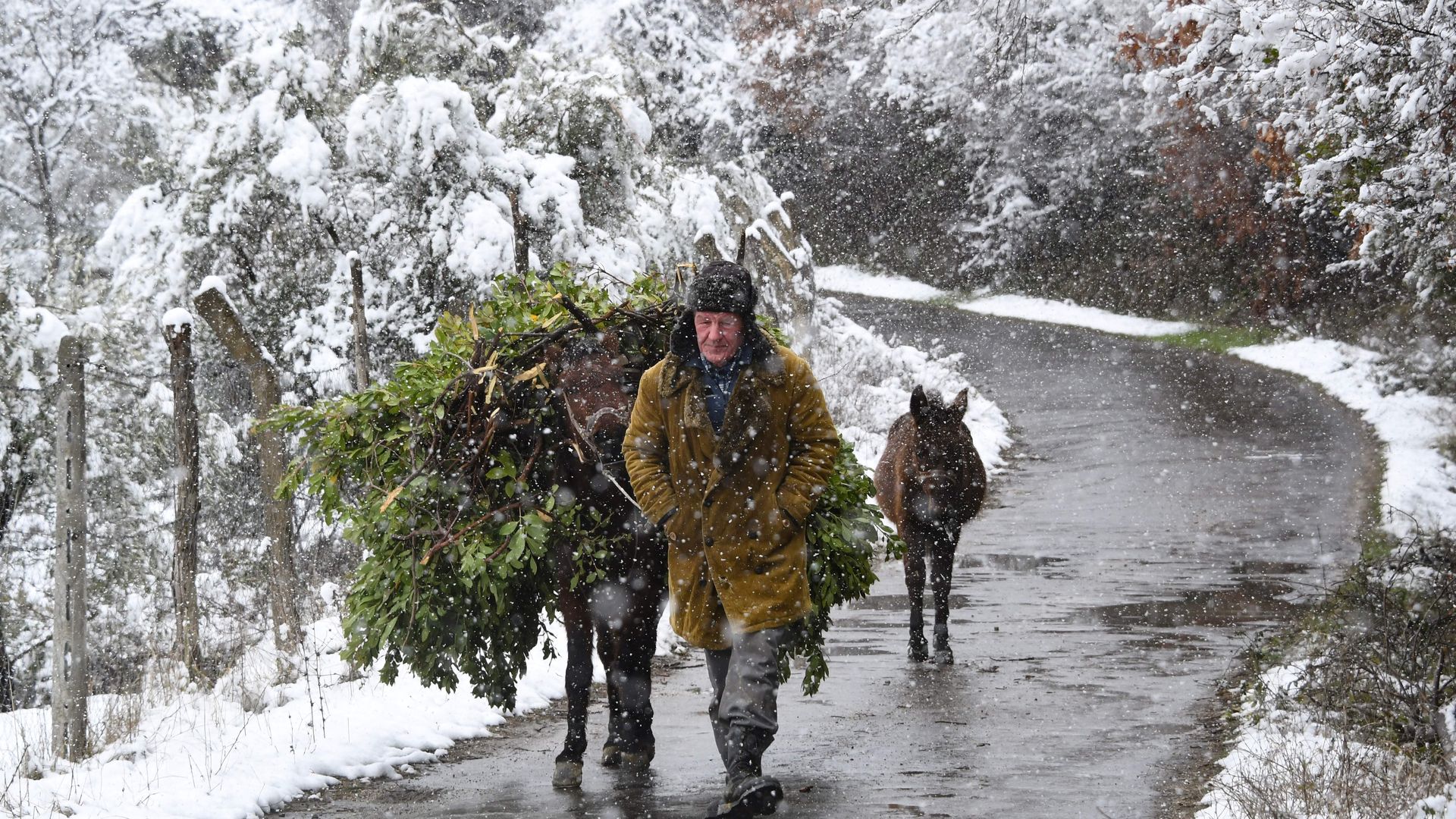 |
|
| A scene from an Albanian village. Photo: Gent ShkullakuU/AFP via Getty |
| |
| In a centuries-old tradition, women in Albania who wanted to escape forced marriages or blood feuds — or to take on societal roles reserved for men — could choose to become "burrneshat," the NYT's Andrew Higgins writes. - "They take an oath of lifelong celibacy and enjoy male privileges, like the right to make family decisions, smoke, drink and go out alone."
- There are perhaps a "dozen or so" burrneshat remaining in Albania. Higgins profiled one named Duni. It's fascinating.
Dive in |
    |
| |
| |
| 7. Stories we're watching |
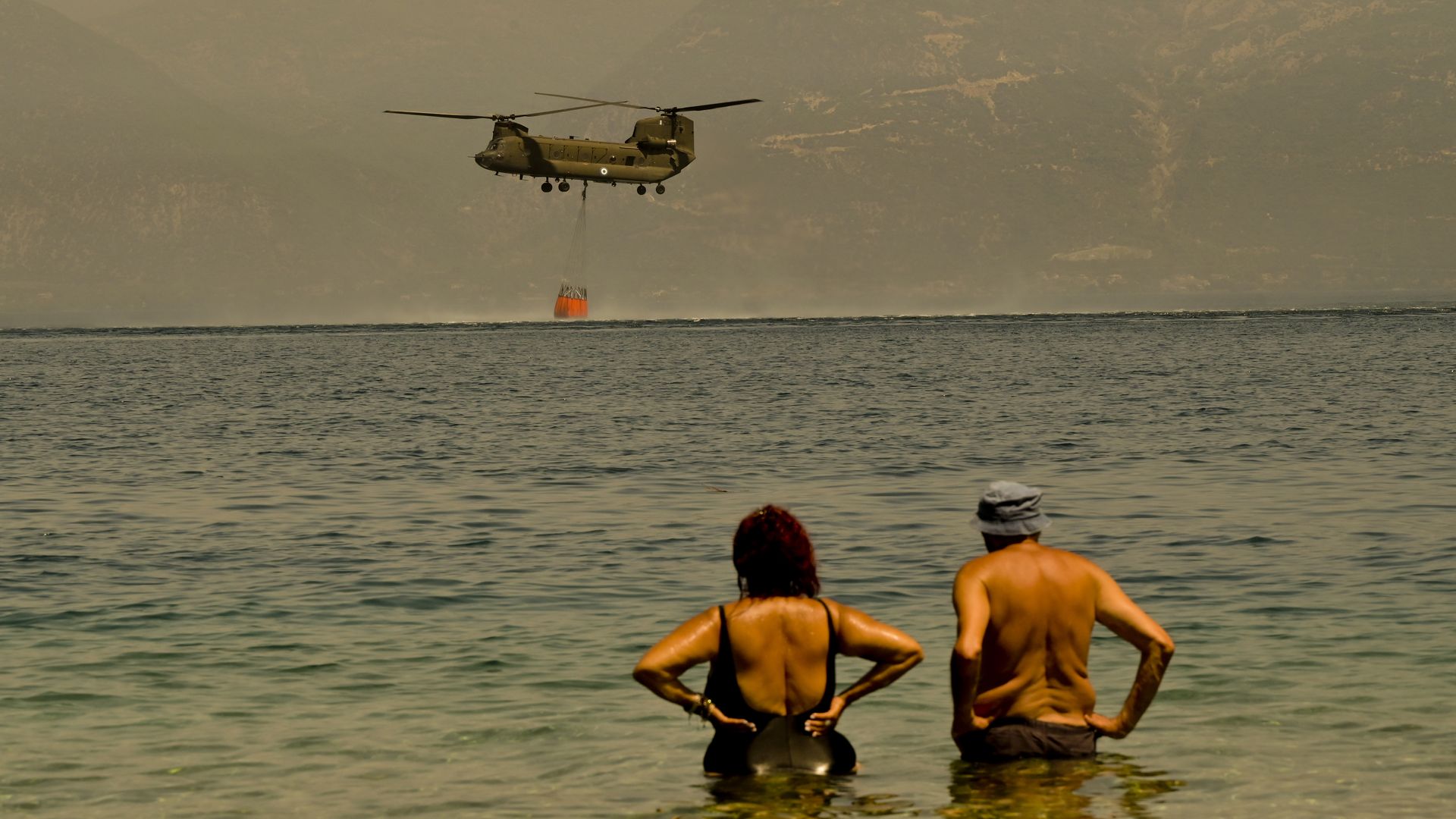 |
|
| A military helicopter gathers water to fight a wildfire in Lambiri, Greece. Photo: Milos Bicanski/Getty Images |
| |
- UN climate report: Even worse than we thought
- In photos: Global wildfires rage
- Scoop: CIA director to visit Israel, Palestinian Authority
- Italy launches COVID passport
- "Modern slavery" on Fiji fishing boat
- China plans tight COVID-19 bubble for Beijing Games
- Lessons for the next Olympics
Quoted: "In order to dictate — I am a completely sane person — you need to have the appropriate resources. I have never dictated anything to anyone and I am not going to." — Belarusian dictator Aleksandr Lukashenko today, rejecting the "nasty" title of dictator. |
    |
| |
| |
| A message from OurCrowd |
| Meet the VCs that invested in Lemonade and Beyond Meat before the IPOs |
| |
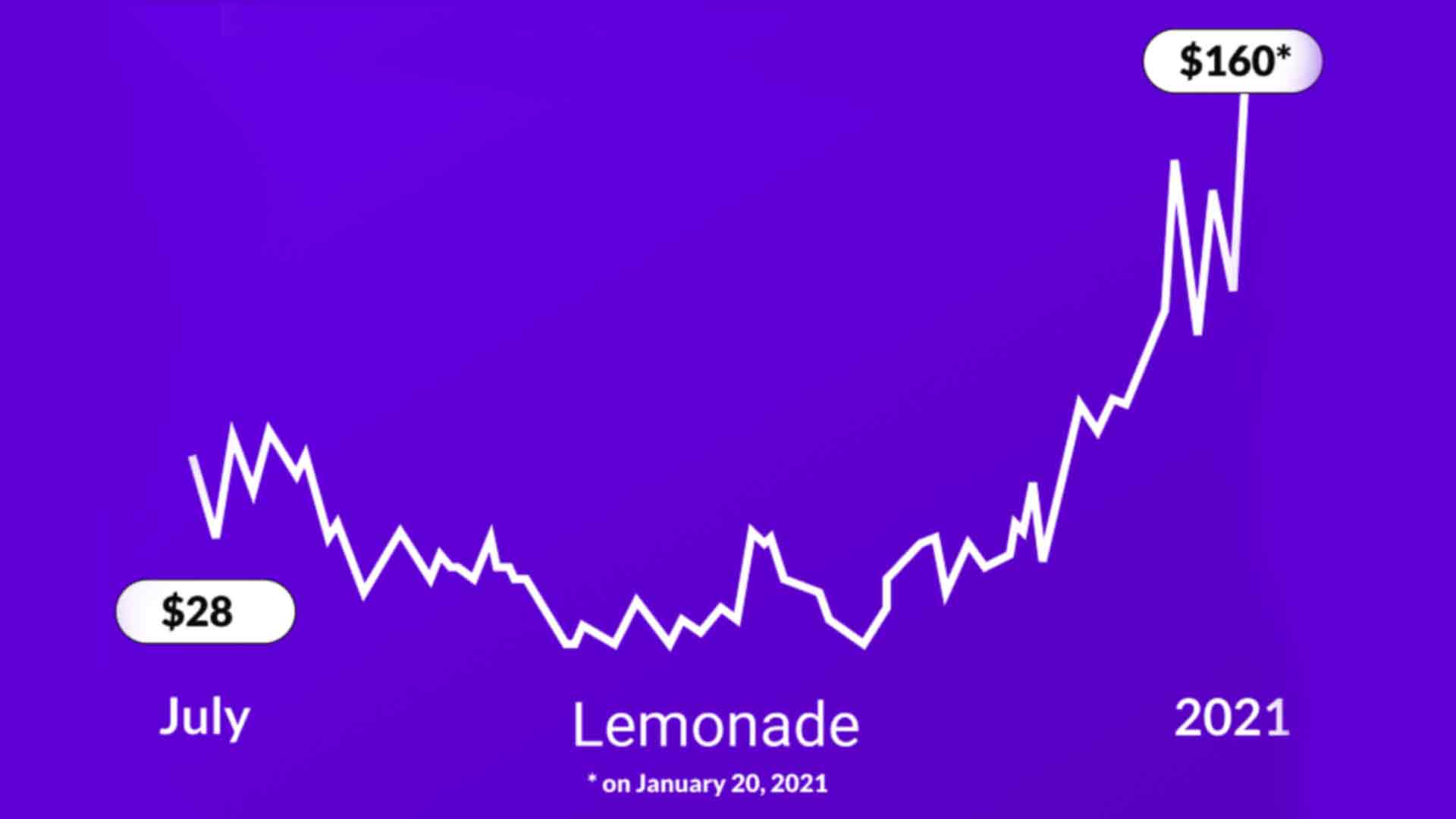 |
| |
| Global network of 73K+ members and 1000+ MNCs (from Honda to P&G and Travelers to Pepsico), OurCrowd accelerates startups' success. Typical rounds are $2-$20M, with opportunity for more alongside institutional investors. Take the next step to global success - with OurCrowd. |
| |
| Answer: Chile's Atacama Desert (red pin) and Antarctica's Dry Valleys. Depending on your criteria, both are often given the label "the driest place on Earth." |
 | | It'll help you deliver employee communications more effectively. | | |












No comments:
Post a Comment